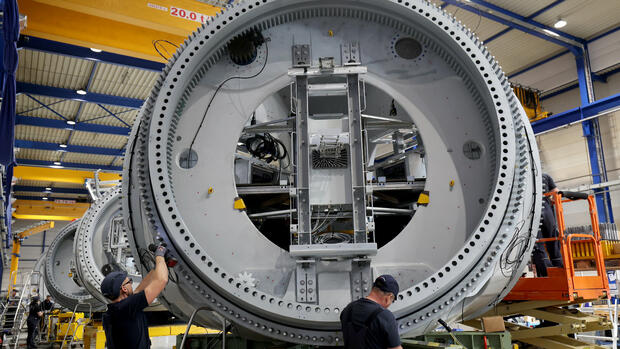Berlin The German economy slipped into a recession in the winter. Gross domestic product (GDP) shrank by 0.3 percent in the first quarter compared to the previous quarter. This was announced by the Federal Statistical Office on Thursday.
After economic output had already fallen by 0.5 percent in the fourth quarter of 2022, the criteria for a technical recession have been met. Economists speak of two consecutive quarters of shrinking economic output.
According to the Wiesbaden statisticians, the high price increases in particular weighed heavily on the German economy. This put pressure on private consumption in particular, which fell by 1.2 percent in the first quarter.
Private households spent less on food and beverages, clothing, shoes and furniture than in the previous quarter. Commerzbank chief economist Jörg Krämer said: “The massive increase in energy prices took their toll in the winter months.”
At the end of April, the Federal Statistical Office had still expected stagnation in the first quarter. Above all, the situation in industry, which was able to expand its business at the beginning of the year, nourished this hope.
March was particularly weak
But March became a problem month for many companies. A number of figures not yet included in the Statistics Office’s first GDP estimate pointed significantly downwards.
Definition: What is a recession?
Ultimately, the value added in the processing industry still increased by two percent in the first quarter. However, industry was not able to compensate for the decline in private consumption.
According to the Federal Statistical Office, the important industrial production dropped by 3.3 percent in March. Hardly any expert had expected such a sharp slump. Bert Rürup, President of the Handelsblatt Research Institute (HRI), spoke of a “considerable setback”.
At the end of last year there had been significantly stronger slumps. But they were mainly due to the energy-intensive industries. In March, however, almost all areas were affected. The decline was strongest in the automotive industry with a minus of 6.5 percent.
At the same time, new business in German industry fell more sharply in March than it has since the peak of the corona crisis. Orders fell in March by 10.7 percent compared to the previous month and thus as sharply as they were last in April 2020. This development was also surprising, a lot of other information would have painted a different picture, says the Berlin economist Claus Michelsen.
Both the decline in production and orders were driven by difficulties in foreign trade. In March, German exports fell by 5.2 percent compared to the previous month. “The weakness in production in Germany is at least partly accompanied by a weakness in foreign trade,” says Torsten Schmidt, head of economic activity at the Leibniz Institute for Economic Research (RWI) in Essen. In addition, the turnaround in interest rates is dampening demand.
Full-year contraction more likely
The technical recession in the winter half-year therefore came as a surprise. However, reports from last autumn that predicted a blatant economic slump in winter have not come true.
Above all, the hoped-for economic stimulus for the German export economy through stronger demand from China did not materialize.
(Photo: dpa)
That doesn’t bode well for the outlook for the year as a whole. A recession in the traditional sense, i.e. a contraction of the economy as a whole in 2023, is now becoming more likely.
In its most recent economic projection for 2023, the federal government forecast mini growth of 0.2 percent – but assumed stagnation in the first quarter.
The latest evaluation of the Ifo business climate index also suggests that the economic mood is not brightening up anytime soon. The barometer fell to 91.7 points in May from 93.4 points in April, as the Ifo Institute announced on Wednesday in its survey of around 9,000 executives. It was the first setback after six climbs in a row.
According to the Ifo, the drivers of the negative development were significantly more pessimistic expectations. But the companies were also a little less satisfied with their current business: “The German economy is skeptical about the summer,” said Ifo President Clemens Fuest.
This is due in particular to the lack of impetus from abroad. Against the background of the uncertain global economic environment, the export expectations of industrial companies are hardly changing.
Above all, the hoped-for economic stimulus for the German export economy through stronger demand from China after the zero-Covid policy there did not materialize. According to the Federal Statistical Office, the German economy exported goods worth 7.5 billion euros to the People’s Republic in April, which was 9.6 percent less than in the same month last year.
The federal government expects GDP growth of 0.4 percent for the current year as a whole.
(Photo: IMAGO/Jochen Tack)
“However, the outlook for the next twelve months remains gloomy overall – especially since the incoming orders on the demand side are noticeably decreasing,” said Ilja Nothnagel, member of the DIHK main management.
>> Read here: Who works in Germany for how long?
According to the German Chamber of Industry and Commerce (DIHK), almost a quarter of companies expect higher export sales in the coming twelve months in early summer – unchanged from the start of the year – while 22 percent expect exports to fall.
More: The winners and losers of high food prices
